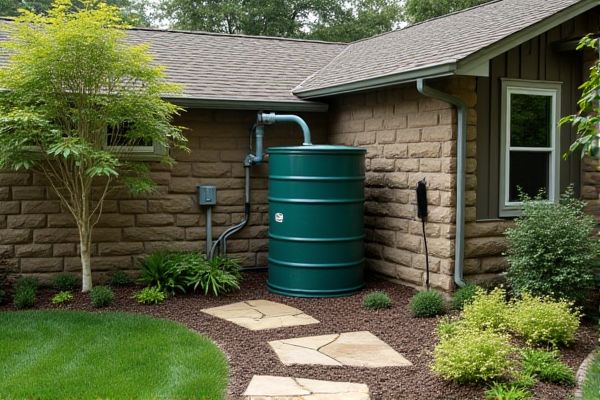
Rain barrels capture and store rainwater for garden use, offering a sustainable, cost-effective irrigation method, while irrigation systems provide automated, efficient water delivery tailored for larger or more complex landscapes. Explore the rest of the article to discover which option best fits your watering needs and maximizes your garden's health.
Table of Comparison
| Feature | Rain Barrel | Irrigation System |
|---|---|---|
| Water Source | Collected Rainwater | Municipal or Well Water |
| Installation Cost | Low ($50-$200) | Medium to High ($500-$2500) |
| Water Efficiency | High (Uses natural rainwater) | Variable (Depends on system type & maintenance) |
| Maintenance | Minimal (Periodic cleaning) | Regular (Check for leaks, clogs) |
| Automation | No | Yes (Timers, sensors available) |
| Environmental Impact | Eco-friendly (Reduces stormwater runoff) | Varies (Depends on water source and use) |
| Water Capacity | Typically 50-100 gallons | Unlimited (Continuous supply) |
| Ideal Use | Small gardens, supplementary watering | Large gardens, farms, landscape irrigation |
Introduction to Rain Barrels and Irrigation Systems
Rain barrels collect and store rainwater from rooftops, providing an eco-friendly solution for garden watering and reducing municipal water usage. Irrigation systems, including drip or sprinkler setups, deliver water directly to plants with controlled precision, optimizing water efficiency and supporting consistent plant growth. Both methods contribute to sustainable water management but differ in technology, capacity, and application scope.
How Rain Barrels Work
Rain barrels collect and store runoff from rooftops via gutters, capturing rainwater in a sealed container for later use. This stored water can be accessed through a spigot or hose connection, allowing you to manually water plants and gardens efficiently. Unlike automated irrigation systems, rain barrels rely on natural precipitation and require regular monitoring to ensure optimal water availability.
How Irrigation Systems Operate
Irrigation systems operate by distributing water through a network of pipes, valves, and emitters to deliver precise amounts directly to plants' root zones, maximizing efficiency and minimizing waste. These systems can be automated with timers and sensors to adjust watering schedules based on soil moisture, weather conditions, and plant needs. Unlike rain barrels that rely on collected rainwater, irrigation systems often connect to a consistent water source, ensuring reliable hydration for landscapes and crops.
Water Conservation: Rain Barrels vs Irrigation Systems
Rain barrels capture and store rainwater from rooftops, offering a sustainable water source that reduces reliance on municipal supply and conserves runoff, which helps prevent soil erosion. Irrigation systems, especially drip and smart irrigation setups, efficiently deliver water directly to plants' roots, minimizing water waste through evaporation and runoff. While rain barrels depend on rainfall availability, combining them with advanced irrigation systems maximizes water conservation by utilizing stored rainwater for precise watering needs.
Installation Costs and Maintenance Requirements
Rain barrels typically have lower installation costs, often ranging from $50 to $200, requiring basic setup to collect and store rainwater. Irrigation systems demand higher initial investments, averaging $1,500 to $3,000 for professional installation, including complex piping and automated controls. Maintenance for rain barrels is minimal, involving occasional cleaning to prevent debris buildup, whereas irrigation systems require regular inspection for leaks, system calibration, and seasonal adjustments to maintain efficiency.
Efficiency and Water Coverage Comparison
Rain barrels efficiently capture and store rooftop runoff for localized garden use, reducing potable water consumption but offering limited water coverage and inconsistent supply during dry periods. Irrigation systems, including drip and sprinkler setups, deliver controlled, uniform water distribution across larger areas, optimizing water use through timers and sensors to prevent overwatering and runoff. Comparing both, irrigation systems provide superior efficiency in water coverage and timing, while rain barrels serve as sustainable supplements enhancing water conservation efforts.
Environmental Impact Assessment
Rain barrels significantly reduce water runoff and conserve rainwater, lowering the demand on local water supplies and minimizing soil erosion. Irrigation systems, while efficient in water delivery, can contribute to resource depletion if not managed properly, especially through overwatering and energy consumption for pumps. You can enhance your environmental impact by choosing rain barrels to collect natural rainfall and supplement irrigation systems with smart controllers to optimize water use.
Suitability for Different Landscapes and Gardens
Rain barrels are ideal for small to medium-sized gardens and landscapes where capturing and reusing rainfall can supplement watering needs efficiently. Irrigation systems, including drip and sprinkler setups, suit larger or more complex landscapes requiring precise, automated watering schedules for diverse plants. Selecting between rain barrels and irrigation systems depends on garden size, plant types, and water availability for optimized landscape irrigation.
Pros and Cons of Each Option
Rain barrels offer an eco-friendly way to capture and reuse rainwater, reducing water bills and conserving resources, but they store limited water and require manual distribution. Irrigation systems provide automated, efficient watering ideal for large gardens or landscapes, ensuring consistent moisture levels and time savings, yet they involve higher installation and maintenance costs and may waste water if not properly managed. Choosing between the two depends on garden size, budget, water needs, and environmental considerations.
Final Decision: Which System is Right for You?
Choosing between a rain barrel and an irrigation system depends on water needs and garden size; rain barrels offer eco-friendly water collection ideal for small gardens, while irrigation systems provide automated, efficient watering suitable for larger landscapes. Consider factors like budget, water availability, and maintenance requirements to determine the best fit for your garden's specific conditions. A hybrid approach can also maximize water conservation and plant health by combining rainwater harvesting with controlled irrigation.
 homyna.com
homyna.com